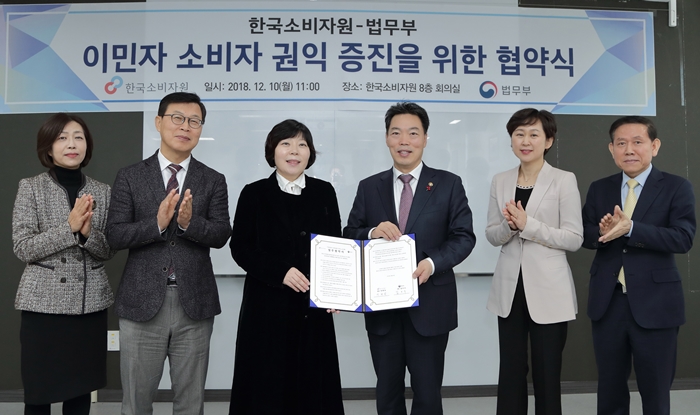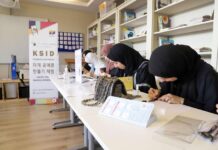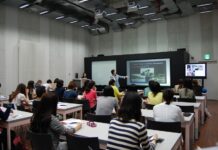
Vice Justice Minister Kim O-su (third from right) on Dec. 10 signs a memorandum of understanding with the Korea Consumer Agency at a regional branch of the agency in Jincheon, Chungcheongbuk-do Province. (Ministry of Justice)
By Park Hye Ri and Hahm Hee-eun
“The mobile phone store manager said the Korean government is providing free mobile phones.”
This is what was told to an unsuspecting African student in February at a mobile phone store in Busan. He went there to purchase a smartphone, and the store manager told him that the Korean government was giving free mobile phones to non-Korean students in Korea.
The student signed the contract thinking he got a great deal but it turned out to be a scam. Fortunately, the Korea Consumer Agency stepped in to help him and 35 other victims of similar contracts arranged by the crooked store.
Non-Korean students in Korea are vulnerable to fraud and unfair treatment if they are unaware of the country’s consumer protection system and other related measures.
To promote the rights of foreign nationals residing in the country and facilitate training in consumer safety, the agency and the Ministry of Justice signed a memorandum of understanding on Dec. 10 at a regional office of the agency in Jincheon, Chungcheongbuk-do Province.
A ministry official said, “Social integration programs including the consumer safety course are required for obtaining a visa or citizenship in Korea.”
The training schedule for next year will be announced by all 309 organizations slated to provide such programs. The courses offered include classes on Korean language and culture, and their topics are considered basic knowledge for those who want to reside in Korea.
Non-Korean residents can apply for the programs through the ministry’s Social Integration Network website (www.socinet.go.kr).
According to the consumer watchdog, 46 major organizations offer non-Korean residents consumer counseling, safety training and assistance in compensation. Demand for such services has surged in recent years, and the agency thus plans to increase the number of consumer training teachers and courses nationwide for the 309 organizations.
Vice Justice Minister Kim said, “If a non-Korean resident receives education in consumer safety, this will be considered participation in a social integration program and prove helpful in obtaining Korean citizenship.”
hrhr@korea.kr























